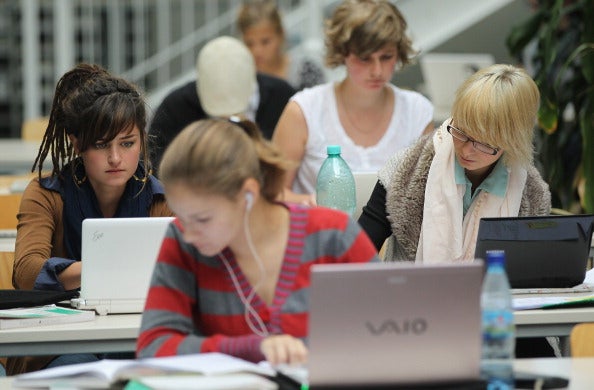Record numbers of women going on to university this year
Gap between male and female applicants receiving places now 'similar to rich-poor divide'

Your support helps us to tell the story
From reproductive rights to climate change to Big Tech, The Independent is on the ground when the story is developing. Whether it's investigating the financials of Elon Musk's pro-Trump PAC or producing our latest documentary, 'The A Word', which shines a light on the American women fighting for reproductive rights, we know how important it is to parse out the facts from the messaging.
At such a critical moment in US history, we need reporters on the ground. Your donation allows us to keep sending journalists to speak to both sides of the story.
The Independent is trusted by Americans across the entire political spectrum. And unlike many other quality news outlets, we choose not to lock Americans out of our reporting and analysis with paywalls. We believe quality journalism should be available to everyone, paid for by those who can afford it.
Your support makes all the difference.Teenage girls are now more than a third more likely to go to university than boys, according to new figures, as the gap between the sexes reaches record levels.
In total, upwards of 30,000 more women than men are set to start degree courses this autumn, official Ucas data shows.
The difference is the largest ever recorded by the university admissions service by this point in the year.
The figures show around 6,600 fewer students have been placed on courses this year, compared with the same point last year.
As of Friday morning, 133,280 UK 18-year-old women had secured a university place, compared with 103,800 UK men of the same age.
Across the UK, 27.3 per cent of all young men are expected to go to university this year, compared with 37.1 per cent of young women.
It means that as of this point – just over a week after A-level results were published – 18-year-old women are 36 per cent more likely to start degree courses this autumn than their male peers of the same age.
Last year they were 35 per cent more likely to enter higher education and five years ago they were 31 per cent more likely.
Ucas suggested one factor contributing to the gender difference is nursing, which has seen a 9 per cent increase in UK 18-year-olds placed on courses this year.
Women significantly outnumber men for these degrees, with around 28 women recruited for every man.
Previous figures have shown an overall drop in nursing applications and acceptances this year – a change thought to be driven by a fall in older students applying, rather than among 18-year-olds.
Dr Mark Corver, Ucas’s director of analysis and research, said: “More UK 18-year-olds will be starting university this autumn than ever before but large differences in who goes remain.
“Our research has shown that the difference between 18-year-old men and women entering university is now similar to that between the richest and poorest halves of the population.
“The statistics today show the difference between men and women slowly growing wider.”
Last year the gap between richer and poorer students reached a record high, with pupils eligible for free school meals – a long term indicator of poverty – said to be less than half as likely to go on to higher education than their most affluent peers.
The number of pupils gaining pass grades at A-level fell for the first time in three years this summer, following the introduction of a tougher new curriculum.
Overall, the latest snapshot shows that as of Friday morning, 482,510 students have secured a university place, down about 1.4 per cent on the same point last year, but higher than any other year at this point.
Around 46,600 students have found their places through clearing, the largest number ever placed through the annual process at this point, Ucas said.
Join our commenting forum
Join thought-provoking conversations, follow other Independent readers and see their replies
Comments